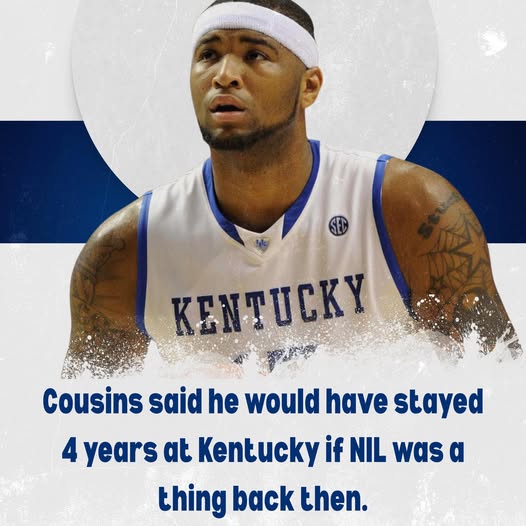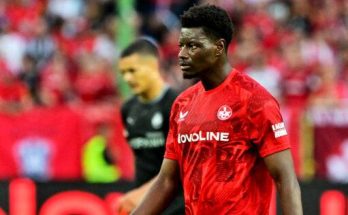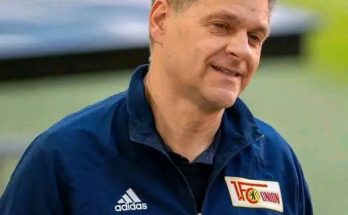DeMarcus “Boogie” Cousins is a name that resonates deeply with basketball fans, particularly those who followed college basketball during the early 2010s. Known for his fiery passion, unmatched skill, and at times controversial demeanor, Boogie quickly rose to become one of the most dominant centers in the NBA. However, before he was a star in Sacramento, before he established himself as a force to be reckoned with on the professional stage, Boogie was a young, up-and-coming talent at the University of Kentucky, where he played under the guidance of legendary coach John Calipari.
In a recent interview, Cousins reflected on his college career, his time at Kentucky, and how things might have been different if one major element had been in place during his time in Lexington: Name, Image, and Likeness (NIL) rights. For many college athletes today, NIL has become a game-changer, offering opportunities that would have been unheard of for previous generations. Boogie himself admitted that had NIL existed during his time at Kentucky, he likely would have stayed for a longer period. In fact, he shared that he loved the Kentucky program, the fans, and even felt he wasn’t quite ready for the NBA when he left. It was a profound acknowledgment of the influence that NIL could have had on his decision and how the landscape of college basketball may have altered the course of his career.
When Cousins first arrived at Kentucky, he was already considered one of the top prospects in the country. Standing at 6-foot-9 and possessing a combination of size, skill, and agility rarely seen in players of his stature, he was a natural fit for John Calipari’s up-tempo, high-pressure system. His arrival in Lexington was met with great fanfare. The Wildcats were ready for another run at a national title, and with Boogie on the roster, hopes were high.
However, Boogie’s one-and-done journey in college basketball was far from smooth. Like many top recruits, the goal was always the NBA, but the road to that goal wasn’t as clear-cut as he may have hoped. Despite a standout season that saw him earn multiple All-American honors and lead Kentucky to the Elite Eight in the 2010 NCAA Tournament, Boogie admitted that he wasn’t entirely certain he was ready for the professional stage. His early departure from Kentucky was driven by the pressure to leave college and capitalize on the NBA draft. After all, that’s what was expected of him — to move on to the next step in his basketball career, and to do so quickly.
Looking back, however, Cousins now recognizes that the decision to leave was less about his readiness for the NBA and more about external pressures. The idea of playing professionally was certainly enticing, and there was no doubt he had the talent to succeed. But the allure of the NBA, the dream to fulfill it, often overshadowed what was best for his growth, both as a player and as an individual. He was 19 years old when he declared for the NBA Draft, and while most people assumed it was the right time for him to go, Boogie has since admitted that the decision may have been a bit rushed.
“I loved the fans. I loved the program,” Boogie reflected, speaking of his time at Kentucky. “Looking back, I wasn’t even sure I was ready for the NBA yet. But I had to go because that’s the path everyone expected me to take. It wasn’t about whether I was ready. It was just about the next step, and that next step was the NBA.”
One of the most significant factors that might have changed Boogie’s trajectory in college basketball is the advent of NIL rights. College athletes now have the opportunity to capitalize on their name, image, and likeness, securing lucrative deals with companies, building their own brand, and making money off their hard-earned success. For someone like Boogie, who was a star at Kentucky from day one, the financial incentives presented by NIL would have been hard to ignore. NIL offers athletes the opportunity to earn substantial income while still being part of the college system — a luxury Boogie never had.
Had NIL been a factor during his time at Kentucky, Boogie might have felt a sense of financial security and independence that would have allowed him to consider staying in college longer. Instead of rushing into the NBA, he could have capitalized on the massive fan support in Lexington and built his personal brand further, all while continuing to play for a program he loved. His connection with Kentucky’s passionate fanbase was deep; their adoration for him was palpable. The atmosphere at Rupp Arena, the cheers and chants that accompanied his every move on the court, were a significant part of what made his college experience so special.
NIL could have given Boogie the freedom to enjoy those years in college without feeling the pressure to leave prematurely. The financial rewards he could have earned would have likely been substantial — not only would his likeness have been used to promote products and services, but he could have worked with various brands to create his own image as a collegiate athlete. Additionally, Boogie could have used his platform to support charitable causes, partner with local businesses, and even take on mentorship roles with younger players. The possibilities would have been endless, all while still honing his skills in college basketball.
One of the more fascinating aspects of Boogie’s reflection is his acknowledgment that he wasn’t fully confident in his readiness for the NBA. While many would consider it a forgone conclusion that a player like him — a top prospect with incredible talent — would be ready to jump to the next level, Boogie felt otherwise. He wasn’t entirely sure if he had the mental and emotional maturity to thrive at the NBA level. College basketball was a safe space for him, a place where he could develop not just as a player, but also as a person. With NIL, he would have had the flexibility to stay at Kentucky longer and grow both on and off the court.
For the Wildcats, the presence of a player like Boogie for an additional season would have been a game-changer. He could have helped elevate the program even further, competing for national championships, and perhaps adding more individual accolades to his already impressive list of accomplishments. Kentucky fans, who adored Boogie, would have had the chance to watch him mature and improve, further solidifying his place in the annals of Wildcats basketball history.
There’s also the argument that staying in college longer would have helped Boogie develop a more well-rounded game. During his time in the NBA, Boogie became known for his dominant post play and rebounding ability, but there were areas of his game that required refinement. Had he stayed in college for another year or two, he could have worked on his overall skill set, learning how to play in a more structured system under Coach Calipari’s tutelage. He would have had more time to adjust his game to the evolving nature of professional basketball, ensuring he was more prepared for the rigors of the NBA.
While Boogie’s decision to leave Kentucky early didn’t result in any major regrets — after all, he enjoyed a lengthy and successful NBA career — it’s clear that the NIL era could have changed his approach to college basketball. It could have provided him with the financial freedom to stay in college longer, giving him the time and space to further develop and prepare for the NBA. Ultimately, the opportunities available to college athletes today, especially those who are as talented and marketable as Boogie Cousins once was, are game-changers. They give players the chance to maximize their potential both on and off the court.
In the end, it’s impossible to say for certain how things would have unfolded if NIL had been a factor during Boogie’s time at Kentucky. However, the mere thought of it speaks to the larger conversation about how NIL has altered the landscape of college athletics. For Boogie, staying at Kentucky longer would have been more than just about the money — it would have been about the love of the game, the love of the fans, and the chance to truly feel ready for the next stage in his career.
The reality is that the one-and-done rule no longer applies to today’s college athletes in quite the same way. With NIL, the focus is now on what’s best for the athlete, and Boogie’s story is a perfect example of how things could have been different had he had more time to explore his options before heading to the NBA. While his journey was still a successful one, it’s a reminder of how NIL could have given him, and many others like him, a better path forward — one that allowed them to balance both their athletic and personal growth.



